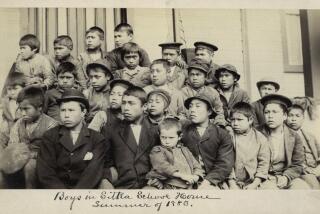A Blackfeet Woman’s Campaign for Justice
- Share via
BROWNING, Mont. — The stories began long ago, as far back as Elouise Cobell can remember.
She was just a child when neighbors gathered at her home on the Blackfeet Indian Reservation, talking of land and money and things she couldn’t understand.
Her parents wondered why they weren’t getting paid regularly for letting others use their land to farm. The older people would say “the agent” had their money.
Elouise listened and learned.
“You knew something was wrong with the picture, but you just felt that you were Indian and people didn’t like you and that you didn’t have any rights,” she recalls. “We were sort of taught to be frightened of the government.”
Today she is no longer afraid.
As the lead plaintiff in a class-action lawsuit over mismanagement of Indian trust accounts, Cobell is taking on the federal government in hopes of reforming the system responsible for distributing royalties and lease money to Indians for the use of their land.
The case could be the final chapter to the stories of Cobell’s childhood, a sequel in which she has become a most unlikely heroine: a college dropout who rose to tribal treasurer, bank chairwoman and champion of one of the most important issues among American Indians.
“It’s just such a wrong that if I didn’t do something about it,” she says, “I’m as criminal as the government.”
About 5 feet 4 inches tall with cropped black hair, the 53-year-old Cobell has more spunk than spite.
She insists she was a bashful child, tucked in the middle of nine brothers and sisters. Back then her world consisted of the 200-acre ranch her parents owned, the one-room schoolhouse she attended until high school and many responsibilities, including collecting water each day from a creek, since the house had no plumbing.
Her dream was to live in the city. Her way out was going to be finance.
“I was always good in math,” she says. “I knew I wanted to go into business.”
After attending Great Falls Commercial College, Cobell enrolled at the University of Montana in pursuit of a business degree. It was then, at age 18, that she began to understand the stories she’d heard as a child.
As part of a work-study program, Cobell was employed as a clerk at the reservation’s Bureau of Indian Affairs office. There she saw firsthand how Indians were treated when they came to ask about their trust accounts.
“People would come in and try to get information, and they’d just make them sit out in hard old wooden chairs,” she recalls. “I had no idea at that point that it was their own money.”
Cobell had to leave college in her junior year to care for her cancer-stricken mother. She eventually moved to Seattle, where she worked in the accounting department of a television station and married a fisherman who also was a Blackfeet member.
Though she never intended to return to the reservation, in the early 1970s her father asked her to come home to run the ranch, which had $18,000 in debts.
“Once we got on that ranch,” Cobell says, “there was no going back. We just wanted to make sure we held onto our land, that nobody would take it from us.”
She and her husband turned the business around, and in 1976 the tribe named Cobell its treasurer.
Still unable to make “hide nor hair of the trust accounts,” she starting looking for answers, first from the BIA, which provided little information, then from congressional leaders. About the same time, Oklahoma tribes also began complaining.
Over the next 20 years she testified before Congress, met with auditors, battled government officials and headed an organization to oversee reform of the trust accounts.
Still, the system’s problems remained. So in 1996 Cobell approached the Native American Rights Fund about filing a lawsuit.
“We knew these issues were there; it just always seemed too difficult to take on,” says NARF Executive Director John Echohawk. “But she convinced us it could be done.”
Along the way, Cobell in 1987 helped open Blackfeet National Bank, the nation’s first Indian-owned financial institution. And in 1997 she was recognized for her efforts with a MacArthur Foundation “genius grant.”
When Blackfeet tell stories to the next generation of children, she wants them to be different from the ones she heard. Their message will be hope, not fear.
“People will be free and not intimidated,” she says. “Doors will be open and not closed. We’ll have the same rights as any other person.”
More to Read
Sign up for Essential California
The most important California stories and recommendations in your inbox every morning.
You may occasionally receive promotional content from the Los Angeles Times.










